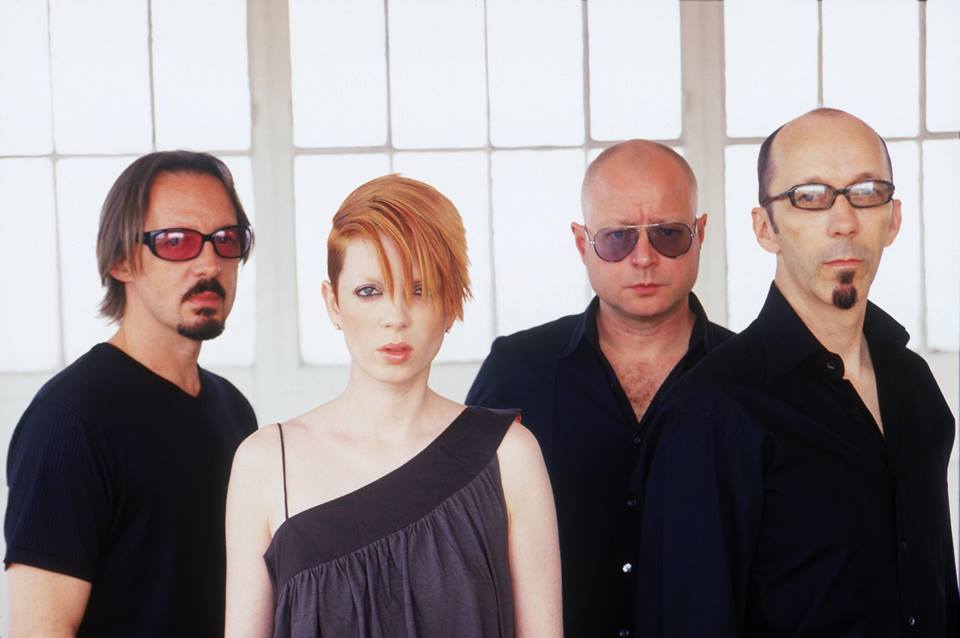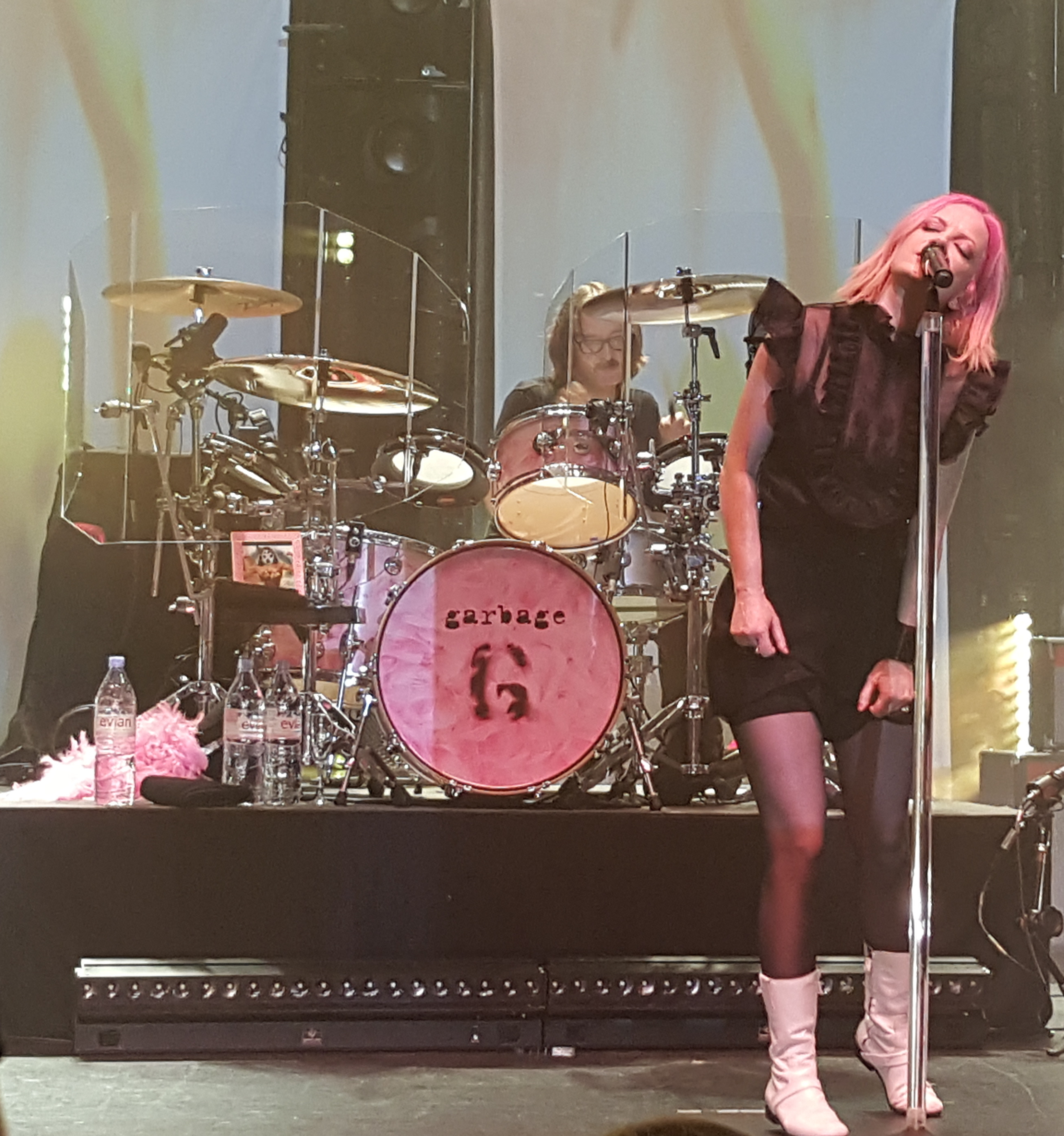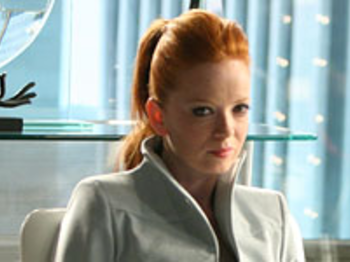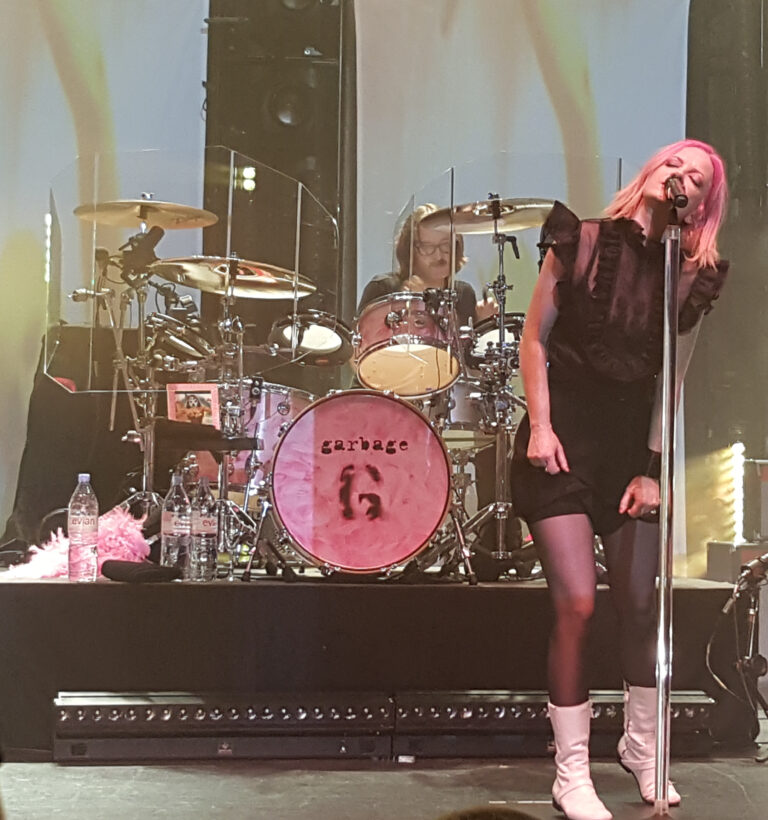
Shirley Manson: Still selfish after all these years.
“That is music, isn’t it?” says Garbage’s lead singer, chirpily, with a laugh. “It is a selfish pursuit in general that then connects to many people and they can make up their minds. It starts a conversation, doesn’t it? It’s forming an opinion.”
It’s that audacious first step that any band takes when they step out of the bedroom or garage and onto a stage. Like us! Or don’t. Here we are now…. There’s that hope that there’s an opportunity to connect to many people.
[This interview first appeared here in Oct. 2015.]
In Garbage’s case, they did just that back in 1995. The group formed the previous year when famed Nirvana producer-turned-drummer Butch Vig, plus two other musician friends from his home state of Wisconsin, recruited Manson, a gorgeous red-haired singer from Scotland, persuading her to leave the band Angelfish to join the boys.
The guys wrote the songs and asked Manson to come up with the words. Garbage mashed up styles – grunge, electronica, shoegaze, hard rock – and burnished them with shiny pop melodies and Manson’s dark-tinged lyrics. And Garbage scored right out of the gate in the post-Nirvana ‘90s, their self-titled debut album yielding big hits like “Stupid Girl” and “Only Happy When It Rains.” They grabbed a Grammy nomination for Best New Artist.
There were three more albums, concluding with Bleed Like Me before the band went on hiatus for what turned out to be 18 months.

Guitarist and keyboard player Steve Marker told me this during a 2012 interview: “We weren’t supportive of one another. There was a lot of negativity around us in ‘05, a lot of it coming from us ending up on giant record labels we hadn’t signed to in the first place [Interscope and Geffen]. But we got pulled to ‘em and then we were competing with Lady Gaga, or whoever it was at the time. We were second-class citizens who got treated badly. We weren’t able to do what we wanted to do and were asked to do a bunch of stuff we didn’t want to do. We’re avoiding all that now.”
They reconvened to do a benefit gig in 2007 and ended up recording a new track, “Tell Me Where It Hurts” for a greatest hits collection, Absolute Garbage.
But Manson, Vig, Marker and bassist/guitarist/keyboardist Duke Erikson didn’t start to write again until 2010, releasing Not Your Kind of People the following year. When Garbage emerged on tour following that record, they began in clubland (selling out) and then, next time around, bigger theaters.
“Nobody really knew what to expect from us,” Manson says, after what she terms another hiatus. (Manson asked the group’s publicist to reach out to me after our interview to reiterate: “Please let him know we never split up. We went on hiatus.”)
“We’d been gone for six or seven years at this point and I think people were very curious to see whether anybody even cared,” Manson, born August 26, 1966, continues. “And that included us as a band. We had no idea if anybody would even remember us. When we brought out our last record our minds were blown once again by the reception that we enjoyed all over the world. We played sold-out shows and it really reignited a new flame inside the band in a funny way.”

They released a new album, Strange Little Birds, in 2016. So, the idea was to complete the album in fall 2015, release it in the spring and launch a tour keyed to it. But something funny happened along the way to the expected album release/tour cycle.
They realized 2015 marked the 20th anniversary of the release of their debut album Garbage, and decided to do something about it. They’d play the whole damn thing – and not much of anything else not from the era – on their 2015 tour.
Manson says their reasoning went like this: “We realized that there’s not going to be another 20th anniversary. We’re not going to keep going with it – the 25th anniversary, the 30th anniversary, that won’t happen! But this felt the right thing to do. I can’t really explain why from an intellectual point of view but it just felt like it was important to us as a band to recognize how incredibly fortunate we are.
And so, we had the 20 Years Queer tour. Watch the behind the scenes video…
“To be in the position that we’re in right now is to be incredibly privileged,” says Manson. “If you’d have asked us in 1995, never in our wildest imagination would we have said that we would still be making music 20 years on. It really is something to be celebrated – a celebration for the fans, but it’s really a lot about the four of us doing something quite selfish.”
“So, when the anniversary came around, we were in the studio working on our new record and it just seemed really important as a human being, to say nothing of being a musician. If you don’t have gratitude in your life you’re unable to appreciate things and when you’re unable to appreciate things you’re not really aware of anything much,” Manson notes.
Although playing the hit album might be a smart retro/commercial gambit, Manson said the idea presented a few problems. “We don’t normally do an entire record,” she says. “We’re literally assuring people we’re only playing the songs between 1995 and 1996. That in itself becomes a brand new discipline for us and it’s made it very exciting for us because we are so used to going out and playing shows peppered [by songs from] four or five other records. You can really change the set because you’ve got so much material to choose from but when you’ve only got 12 songs” – she laughs – “and some B-sides nobody’s ever heard and that’s a challenge to pull off in front of an audience.”
“Well, well, well, we meet again,” Manson cooed, greeting the Boston audience after playing “Subhuman,” “Supervixen” and “Queer.” “This isn’t a nostalgia trip for us; this is a celebration.”
As with the last tour, Eric Avery, formerly of Jane’s Addiction, joined on bass, making them a quintet. The show ran an hour and 50 minutes. They didn’t do the songs sequentially and they added two juicy covers: The Jam’s “The Butterfly Collector” early on and Vic Chesnutt’s “Kick My Ass” later in the set. The tunes that brought the house down, “Only Happy When It Rains” and “Stupid Girl,” came near the end.
“Playing songs that aren’t all hits is a challenge,” Manson told me during the interview, “trying to keep your audience engaged.”
Garbage fans got no hints of songs of future Garbage, but Manson did talk with me about them. Don’t expect radical change.
“I think the great thing about our music is we actually have done quite a lot of different things throughout our career,” Manson says, “so that I don’t think anybody really is surprised by anything we explore on each record. Ultimately, it always ends up sounding very distinctly like Garbage. We have a sound that’s, for better or for worse, whether you love us or hate us, very unique and that’s difficult in a world where there’s a plethora of bands and there’s music to listen to every day. So I think we are hoping it sounds like Garbage. It’s quite a dark record in some ways and I keep saying it’s quite romantic sounding, too, because its feelings are more abstract and not so specific which in the past I think they were.”
Lester Bangs’ old line – “The song means whatever you think it means” – is brought up. “Exactly,” says Manson. “As a listener, we always project ourselves into the story of each song, which I love. It becomes so specific to us regardless of who wrote it and what their intention was.”
The songwriting process has changed over time. It’s not quite the guys work out the jams and hand them over to the gal that it started out as. “I’ve become more and more involved in the studio process,” says Manson. “We very much operate as a foursome. The band were just teasing me yesterday, reminding me that my first keyboard fill was going to be on the new record. They were highly amused by that. We all take turns playing things and we all have ideas, though I do take main dominion over the lyrics because I’m the one ultimately that’s taken to task for anything that comes out of my mouth. So I should be the one who makes those decisions, ultimately. Maybe it’s not fair on the band at times, but I just think it’s easier on all of us if we’re on the same page.”
During the band’s first hiatus, Manson’s mother took very ill and died within 18 months. “That kind of threw my train off the tracks,’ Manson says. “Not in any major way. I didn’t collapse. I didn’t have a breakdown or anything like that, but it shook me up enough where my focus was really taken away from the band for the first time ever.”

But then a bit of luck. “I was invited to become a regular on a TV show and I got this incredible role,” she says. “It was something I really wanted to do and I fell into that.” Manson portrayed a terminator, Catherine Weaver, for 17 episodes of Fox TV’s Terminator: The Sarah Connor Chronicles in 2008 and ’09.
She’s open to acting again – “it all depends on the role” – but it also helped her for when Garbage regrouped.
So when it came to digging up Garbage, Manson says, “The time was right. We just needed to make more music. We’d become clear of a lot of contractual obligations, which took a lot of pressure off the relationships because of the expectations that had been on us as musicians. Once we were released of all these obligations, [we thought] ‘We’ve got nothing to lose here, we love each other, let’s make some music. Let’s see what we’ve got to say between ourselves.’”
As to what that is – or will be – Manson says this: “The interesting thing is the kind of band that we are we’ve been very vocal about some very difficult subject matters – we have talked about sex, we’ve talked about religion, we’ve talked about gender, we’ve talked about the sexual abuse that went on and continues sometimes to go on in the Catholic Church at the hands of powerful priests, and I think the people that are attracted to this band, it’s for those reasons. We’ve been candid about the darkness that exists in our culture. And people have connected very deeply with that.
“When they come to these anniversary shows I can see the connection and it’s powerful – people crying, people laughing their heads off. The shows are about them; the shows are not about us. We’re being selfish about going out and doing this for ourselves, but in doing so we are definitely there to serve them, and that makes for a powerful connection between us and the audience.”
Watch Garbage perform on Monday Night Football in 2018
[easy_sign_up title=”Sign up for the Best Classic Bands Newsletter”]
- Tommy James Interview: The Music, Mob & ‘Mony Mony’ - 04/29/2024
- J. Geils Talks About His Former Band: Last Interview - 04/11/2024
- 10 Unusual and Surprising Cover Songs - 03/30/2024

